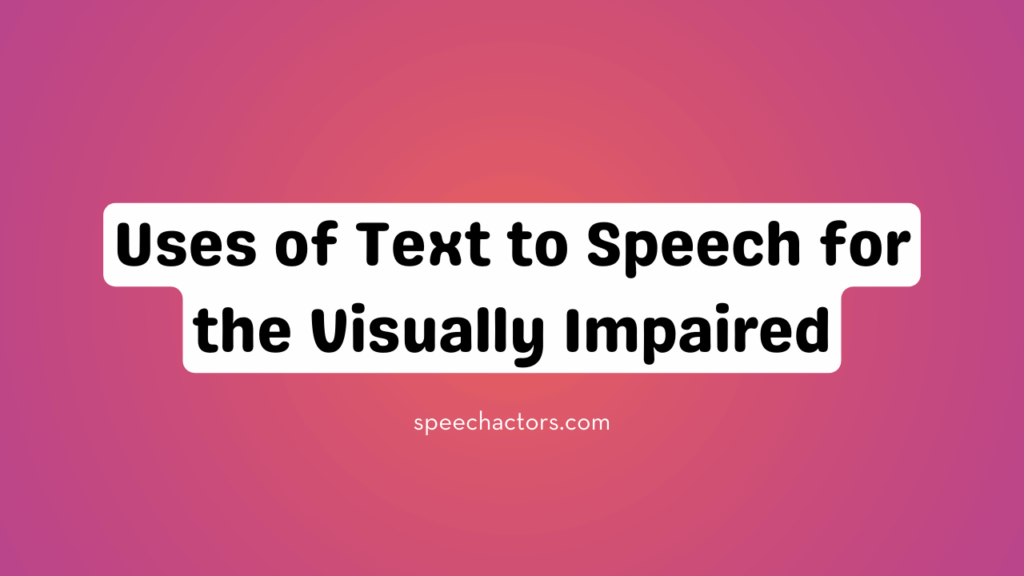Text-to-Speech (TTS) technology transforms written content into natural, spoken words, creating new opportunities for those with visual impairments. Accessibility tools like TTS play a vital role in making information, education, and daily tasks more approachable.
By converting text into clear audio, TTS empowers visually impaired individuals to navigate digital content, read books, and access learning resources independently. This technology enhances both confidence and convenience, opening doors to education, communication, and personal growth while promoting a more inclusive and accessible environment for everyone.
Understanding TTS for the Visually Impaired
Text-to-Speech (TTS) is a technology that transforms written text into spoken voice, making information accessible in audio form. It works by scanning digital text, processing it through speech engines, and generating natural-sounding audio that users can listen to instantly. This allows visually impaired individuals to consume books, articles, messages, and online content without relying on sight.
Additionally, TTS plays a key role in daily activities, from reading emails and documents to navigating smartphones, websites, and applications. It provides independence in accessing education, work, and entertainment. Furthermore, TTS simplifies digital navigation, enabling smooth interaction with screen readers, voice assistants, and accessible software tools.
Key Uses of TTS for the Visually Impaired
Text-to-Speech (TTS) plays an important role in making life easier for the visually impaired. It allows them to listen to books, articles, and documents read aloud in clear voices. TTS also helps in navigating websites, mobile apps, and e-learning platforms by turning written content into speech.
In schools and colleges, it supports students by reading lessons, study material, and exam content. At workplaces, it improves accessibility by assisting in professional tasks such as reading emails, reports, and presentations.
TTS also brings entertainment, making audiobooks, news, and media more enjoyable and accessible, creating a more inclusive experience for daily life.
Benefits of TTS for Visually Impaired Users
- Promotes independence and self-sufficiency
TTS allows visually impaired individuals to listen to books, articles, and digital documents without relying on others. This autonomy helps them manage personal and professional tasks independently. - Improves learning and information retention
Studies from educational institutes show that listening while reading enhances memory and comprehension. For visually impaired students, TTS provides a consistent way to absorb and retain new information. - Provides equal access to digital content
With TTS, websites, eBooks, PDFs, and apps become accessible. This ensures inclusivity, giving visually impaired users the same access to online learning, entertainment, and work resources as sighted individuals. - Reduces reliance on human assistance
Instead of waiting for help, users can instantly access information through TTS. This reduces dependence on family members, teachers, or colleagues, fostering greater confidence and freedom.
How Educators and Caregivers Can Leverage TTS
Educators and caregivers can leverage TTS by blending it into everyday learning. When integrated into digital books, classroom platforms, or worksheets, Text-to-Speech turns written material into engaging audio, making lessons easier to follow.
Personalizing the reading pace and choosing different voices helps children and learners of all ages understand content at their own comfort level. Furthermore, pairing TTS with assistive technologies like screen readers or braille displays builds inclusive environments for visually impaired or differently-abled learners.
This combination enhances independence, supports diverse learning styles, and ensures everyone has equal access to information, whether at school, at home, or during self-study.
Why Choose Speechactors for TTS Solutions
Speechactors stands out as a powerful TTS solution because it offers natural voice quality with advanced customization. Users can select tones, pacing, and emotions to match their needs, making every narration sound real and engaging.
Additionally, Speechactors supports multiple languages and accents, helping people connect with global audiences without limits. This makes it easy to create content that feels personal and culturally relevant.
Furthermore, Speechactors integrates smoothly with devices, apps, and educational platforms, making learning and communication more accessible. With such flexibility and innovation, Speechactors brings text to life in a way that feels human and interactive, perfect for modern digital use.
Frequently Asked Questions (FAQs)
Can TTS read all types of digital content?
TTS can read eBooks, PDFs, websites, and documents. Modern tools like Speechactors support multiple formats, making content accessible for visually impaired users anytime, anywhere.
How accurate and natural are Speechactors’ voices?
Speechactors’ voices sound clear, natural, and expressive. Advanced AI models replicate human intonation, pauses, and emphasis, creating an engaging listening experience for all types of content.
Can TTS be used offline for visually impaired users?
Speechactors offers offline support on certain devices, allowing users to access books, articles, and notes without internet. Offline TTS ensures uninterrupted learning and reading.
How can educators implement TTS in classrooms?
Educators use TTS to read study materials, highlight key points, and support students with learning difficulties. It increases engagement, comprehension, and classroom inclusivity effectively.
What devices support Speechactors TTS solutions?
Speechactors works on smartphones, tablets, and computers. It is compatible with iOS, Android, and Windows, ensuring students and users can access TTS anywhere, anytime.
Conclusion
Text-to-Speech technology empowers the visually impaired by enhancing accessibility, independence, and learning opportunities. By converting written content into clear, natural speech, TTS allows users to engage with books, articles, and digital platforms effortlessly.
Platforms like Speechactors provide advanced voices and customizable features, making daily tasks and education more manageable and enriching. Embracing TTS tools opens doors to greater confidence and autonomy.
Explore Speechactors today to experience how seamless, voice-driven accessibility can transform learning, communication, and everyday life for the visually impaired.
